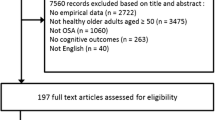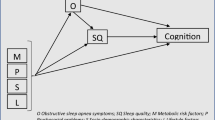Abstract
Both sleep-disordered breathing (SDB) and cognitive impairment are common among older adults, yet few studies have examined their relationship within this population to determine whether the effect of SDB on cognition is of a magnitude similar to or greater than that observed in younger and middle-aged adults. Here, we review the extant literature and report that studies are largely supportive of an association between SDB and cognitive impairment in older adults, particularly in the domains of attention/vigilance, executive function, and verbal delayed recall memory. Presence of the APOE4 allele may confer increased vulnerability to SDB-associated cognitive dysfunction among elderly individuals. Although findings are mixed, there is strong evidence to suggest that SDB-related intermittent hypoxemia is the primary mechanism through which SDB exerts its adverse effects on cognition. We propose a microvascular model in which chronic intermittent hypoxemia causes vasculopathy that ultimately is expressed as cognitive impairment in the older adult. However, it remains unclear whether the effects of SDB on cognition are the same regardless of age or whether there is a synergistic interaction between age and SDB.

Similar content being viewed by others

References
Papers of particular interest, published recently, have been highlighted as: • Of importance •• Of major importance
Ancoli-Israel S, Kripke DF, Klauber MR, et al. Sleep-disordered breathing in community-dwelling elderly. Sleep. 1991;14:486–95.
Salthouse TA. Selective review of cognitive aging. J Int Neuropsychol Soc. 2010;16:754–60.
Jackson ML, Stough C, Howard ME, et al. The contribution of fatigue and sleepiness to depression in patients attending the sleep laboratory for evaluation of obstructive sleep apnea. Sleep and Breathing. 2011;15:439–45.
Beebe DW, Groesz L, Wells C, et al. The neuropsychological effects of obstructive sleep apnea: a meta-analysis of norm-referenced and case-controlled data. Sleep. 2003;26:298–307.
Aloia MS, Arnedt JT, Davis JD, et al. Neuropsychological sequelae of obstructive sleep apnea–hypopnea syndrome: a critical review. J Int Neuropsychol Soc. 2004;10:772–85.
He W, Sengupta M, Velkoff VA, DeBarros KA. 65+ in the United States. In: US census bureau current population reports. Washington, D.C: U.S. Government Printing Office; 2005. p. 23–209.
Medicine AAoS. International classification of sleep disorders, edition 2: diagnostic and coding manual. Westchester: American Academy of Sleep Medicine; 2005.
De Backer WA. Central sleep apnoea, pathogenesis and treatment: an overview and perspective. Eur Respir J. 1995;8:1372–83.
Norman D, Loredo JS. Obstructive sleep apnea in older adults. Clin Geriatr Med. 2008;24:151–65. ix.
McMahon JP, Foresman BH, Chisholm RC. The influence of CPAP on the neurobehavioral performance of patients with obstructive sleep apnea hypopnea syndrome: a systematic review. WMJ. 2003;102:36–43.
Mazza S, Pepin JL, Naegele B. Driving ability in sleep apnoea patients before and after CPAP treatment: evaluation on a road safety platform. Eur Respir J. 2006;28:1020–8.
Zimmerman ME, Arnedt JT, Stanchina M, et al. Normalization of memory performance and positive airway pressure adherence in memory-impaired patients with obstructive sleep apnea. Chest. 2006;130:1772–8.
Aloia MS, Arnedt JT, Stepnowsky C, et al. Predicting treatment adherence in obstructive sleep apnea using principles of behavior change. J Clin Sleep Med. 2005;1:346–53.
Young T, Palta M, Dempsey J, et al. The occurrence of sleep-disordered breathing among middle-aged adults. N Engl J Med. 1993;328:1230–5.
Carskadon MA, Dement WC. Respiration during sleep in the aged human. J Gerontol. 1981;36:420–3.
Launois SH, Pepin JL, Levy P. Sleep apnea in the elderly: a specific entity? Sleep Med Rev. 2007;11:87–97.
Berry DT, Webb WB, Block AJ. Sleep apnea syndrome. A critical review of the apnea index as a diagnostic criterion. Chest. 1984;86:529–31.
Ancoli-Israel S, Palmer BW, Cooke JR, et al. Cognitive effects of treating obstructive sleep apnea in Alzheimer’s disease: a randomized controlled study. J Am Geriatr Soc. 2008;56:2076–81.
Shochat T, Pillar G. Sleep apnoea in the older adult: pathophysiology, epidemiology, consequences and management. Drugs Aging. 2003;20:551–60.
Beaulieu-Bonneau S, Hudon C. Sleep disturbances in older adults with mild cognitive impairment. Int Psychogeriatr. 2009;21:654–66.
Naismith SL, Rogers NL, Hickie IB, et al. Sleep well, think well: sleep–wake disturbance in mild cognitive impairment. J Geriatr Psychiatr Neurol. 2010;23:123–30.
McCurry SM, Ancoli-Israel S. Sleep dysfunction in Alzheimer’s disease and other dementias. Curr Treat Options Neurol. 2003;5:261–72.
Neikrug AB, Ancoli-Israel S. Sleep disorders in the older adult—a mini-review. Gerontology. 2010;56:181–9.
Yesavage J, Bliwise D, Guilleminault C, et al. Preliminary communication: intellectual deficit and sleep-related respiratory disturbance in the elderly. Sleep. 1985;8:30–3.
Berry DT, Phillips BA, Cook YR, et al. Geriatric sleep apnea syndrome: a preliminary description. J Gerontol. 1990;45:M169–74.
Aloia MS, Ilniczky N, Di Dio P, et al. Neuropsychological changes and treatment compliance in older adults with sleep apnea. J Psychosom Res. 2003;54:71–6.
Mathieu A, Mazza S, Decary A, et al. Effects of obstructive sleep apnea on cognitive function: a comparison between younger and older OSAS patients. Sleep Med. 2008;9:112–20.
Alchanatis M, Zias N, Deligiorgis N, et al. Comparison of cognitive performance among different age groups in patients with obstructive sleep apnea. Sleep and breathing. 2008;12:17–24.
• Kim SJ, Lee JH, Lee DY, et al. Neurocognitive dysfunction associated with sleep quality and sleep apnea in patients with mild cognitive impairment. Am J Geriatr Psychiatr. 2011;19:374–81. This study is notable because it specifically examined SDB in older adults with MCI. Individuals with MCI are at high risk of developing dementia. Although no differences were found between MCI and control groups on measures of AHI and hypoxemia, higher AHI was associated with poorer performance on a language test among individuals with MCI.
Katz MJ, Lipton RB, Hall CB, et al. Age-specific and sex-specific prevalence and incidence of mild cognitive impairment, dementia, and Alzheimer dementia in blacks and whites: a report from the Einstein Aging Study. Alzheimer Dis Assoc Disord. 2011.
Albert MS, DeKosky ST, Dickson D, et al. The diagnosis of mild cognitive impairment due to Alzheimer’s disease: recommendations from the National Institute on Aging-Alzheimer’s Association workgroups on diagnostic guidelines for Alzheimer’s disease. Alzheimer’s and Dementia. 2011;7:270–9.
Phillips BA, Berry DT, Schmitt FA, et al. Sleep-disordered breathing in the healthy elderly. Clinically significant? Chest. 1992;101:345–9.
Boland LL, Shahar E, Iber C, et al. Measures of cognitive function in persons with varying degrees of sleep-disordered breathing: the Sleep Heart Health Study. J Sleep Res. 2002;11:265–72.
Foley DJ, Masaki K, White L, et al. Sleep-disordered breathing and cognitive impairment in elderly Japanese-American men. Sleep. 2003;26:596–9.
Sforza E, Roche F, Thomas-Anterion C, et al. Cognitive function and sleep related breathing disorders in a healthy elderly population: the SYNAPSE study. Sleep. 2010;33:515–21.
Corder EH, Saunders AM, Strittmatter WJ, et al. Gene dose of apolipoprotein E type 4 allele and the risk of Alzheimer’s disease in late onset families. Science. 1993;261:921–3.
Kadotani H, Kadotani T, Young T, et al. Association between apolipoprotein E epsilon4 and sleep-disordered breathing in adults. JAMA. 2001;285:2888–90.
O’Hara R, Schroder CM, Kraemer HC, et al. Nocturnal sleep apnea/hypopnea is associated with lower memory performance in APOE epsilon4 carriers. Neurology. 2005;65:642–4.
Spira AP, Blackwell T, Stone KL, et al. Sleep-disordered breathing and cognition in older women. J Am Geriatr Soc. 2008;56:45–50.
Kim H, Dinges DF, Young T. Sleep-disordered breathing and psychomotor vigilance in a community-based sample. Sleep. 2007;30:1309–16.
Hayward L, Mant A, Eyland A, et al. Sleep disordered breathing and cognitive function in a retirement village population. Age Ageing. 1992;21:121–8.
Dealberto MJ, Pajot N, Courbon D, Alperovitch A. Breathing disorders during sleep and cognitive performance in an older community sample: the EVA Study. J Am Geriatr Soc. 1996;44:1287–94.
Cohen-Zion M, Stepnowsky C, Marler, et al. Changes in cognitive function associated with sleep disordered breathing in older people. J Am Geriatr Soc. 2001;49:1622–7.
•• Yaffe K, Laffan AM, Harrison SL, et al. Sleep-disordered breathing, hypoxia, and risk of mild cognitive impairment and dementia in older women. JAMA. 2011;306:613–9. This longitudinal study of 298 older women drawn from the community found that women with SDB had a nearly twofold increased risk of developing either mild cognitive impairment or dementia over a 5-year follow-up period. Furthermore, within women with SDB, measures of hypoxemia, but not sleep fragmentation or sleep duration, were associated with mild cognitive impairment or dementia risk.
• Blackwell T, Yaffe K, Ancoli-Israel S, et al. Associations between sleep architecture and sleep-disordered breathing and cognition in older community-dwelling men: the Osteoporotic Fractures in Men Sleep Study. J Am Geriatr Soc. 2011;59:2217–25. This community-based study of 2,909 older men found relationships between severe hypoxemia and performance on a vigilance test. No relationships were found between cognitive performance and mild indicies of SDB, suggesting that there may be a threshold effect at which hypoxemia exerts a negative impact on cognition.
Lanfranchi P, Somers VK. Obstructive sleep apnea and vascular disease. Respir Res. 2001;2:315–9.
Kato M, Roberts-Thomson P, Phillips BG, et al. Impairment of endothelium-dependent vasodilation of resistance vessels in patients with obstructive sleep apnea. Circulation. 2000;102:2607–10.
Silverberg DS, Oksenberg A, Iaina A. Sleep-related breathing disorders as a major cause of essential hypertension: fact or fiction? Curr Opin Nephrol Hypertens. 1998;7:353–7.
Logan AG, Perlikowski SM, Mente A, et al. High prevalence of unrecognized sleep apnoea in drug-resistant hypertension. J Hypertens. 2001;19:2271–7.
Shahar E, Whitney CW, Redline S, et al. Sleep-disordered breathing and cardiovascular disease: cross-sectional results of the Sleep Heart Health Study. Am J Respir Crit Care Med. 2001;163:19–25.
Monahan K, Redline S. Role of obstructive sleep apnea in cardiovascular disease. Curr Opin Cardiol. 2011;26:541–7.
Ayalon L, Ancoli-Israel S, Drummond SP. Obstructive sleep apnea and age: a double insult to brain function? Am J Respir Crit Care Med. 2010;182:413–9.
Tomfohr LM, Ancoli-Israel S, Loredo JS, Dimsdale JE. Effects of continuous positive airway pressure on fatigue and sleepiness in patients with obstructive sleep apnea: data from a randomized controlled trial. Sleep. 2011;34:121–6.
Tregear S, Reston J, Schoelles K, Phillips B. Continuous positive airway pressure reduces risk of motor vehicle crash among drivers with obstructive sleep apnea: systematic review and meta-analysis. Sleep. 2010;33:1373–80.
Barbe F, Duran-Cantolla J, Capote F, et al. Long-term effect of continuous positive airway pressure in hypertensive patients with sleep apnea. Am J Respir Crit Care Med. 2010;181:718–26.
Lavie L, Lavie P. Ischemic preconditioning as a possible explanation for the age decline relative mortality in sleep apnea. Med Hypotheses. 2006;66:1069–73.
Dinges DI, Powell JW. Microcomputer analysis of performance on a portable, simple visual RT task sustained operations. Behav Res Methods Instrum Comput. 1985;17:652–5.
Lewis RF, Rennick PM. Manual for the repeatable cognitive-perceptual-motor batter. Gross Point Park: Axon; 1979.
Army Individual Test Battery. Manual of directions and scoring. Washington, D.C: War Department, Adjutant General’s Office; 1944.
Wechsler D. Wechsler Adult Intelligence Scale–4th edition. administration and scoring manual. San Antonio: Psychological Corporation; 2008.
Connors K. CPT: Connors’ continuous performance test. Toronto: Multi-Health Systems; 1995.
Golden CJ. Stroop Color and Word Test: a manual for clinical and experimental uses. Chicago, IL: Stoelting; 1978.
Raven JC. Progressive matrices: a perceptual test of intelligence. Individual form. Oxford: Oxford Psychologists Press; 1938.
Spreen O, Benton AL. Neurosensory Center Comprehensive Examination for Aphasia (NCCEA) (revised edition). Victoria: University of Victoria Neuropsychology Labratory; 1977.
Benedict RHB, Schretlen D, Brandt J. Hopkins Verbal Learning Test: revised: instructions for administration and scoring. Odessa: Psychological Assessment Resources; 1997.
Rey A. L’examine clinique en psychologie. Paris: Press Universitaire de France; 1958.
Benedict RHB. Brief visuospatial memory test–revised. Odessa: Psychological Assessment Resources; 1998.
Delis DC, Kramer JH, Kaplan E, Ober BA. California Verbal Learning Test–second edition, adult version. San Antonio: Psychological Corporation; 2000.
Wechsler D. Wechsler Memory Scale–fourth edition. administration and scoring manual. San Antonio: Psychological Corporation; 2009.
Disclosure
No potential conflicts of interest relevant to this article were reported.
Author information
Authors and Affiliations
Corresponding author
Rights and permissions
About this article
Cite this article
Zimmerman, M.E., Aloia, M.S. Sleep-Disordered Breathing and Cognition in Older Adults. Curr Neurol Neurosci Rep 12, 537–546 (2012). https://doi.org/10.1007/s11910-012-0298-z
Published:
Issue Date:
DOI: https://doi.org/10.1007/s11910-012-0298-z



